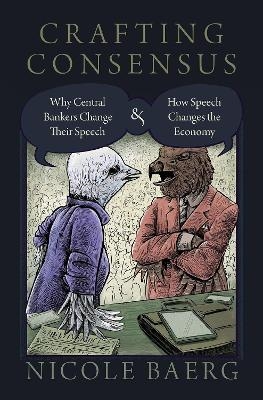
Crafting Consensus
Oxford University Press Inc (Verlag)
978-0-19-049948-8 (ISBN)
In Crafting Consensus, Nicole Baerg explains how the transparency of central bank communication depends on the configuration of committee members' preferences. Baerg argues that monetary policy committees composed of members with differing preferences over inflation are better suited to communicating precise information with the public. These diverse committees produce central bank statements of higher quality and less uncertainty than those from more homogeneous committees. Additionally, she argues that higher quality statements more effectively shape individuals' inflation expectations and move the economy in ways that policymakers intend. Baerg demonstrates that central bankers are not impartial technocrats and that their preferences and the institutional rules where they work matter for understanding the politics of monetary policy and variations in economic performance over time.
Conducting empirical analysis from historical archival data, textual analysis, machine-learning, survey experiments, and cross-sectional time-series data, Crafting Consensus offers a new theory of committee decision making and a battery of empirical tests to provide a rich understanding of modern-day central banking.
Nicole Baerg is Assistant Professor in Government and co-director of the Essex Summer School in Social Science Data Analysis at the University of Essex. She worked previously as a research intern at the Federal Reserve Bank of Atlanta. Her research interests include comparative political institutions, central banking, political economy, quantitative text analysis, and European integration.
1 Crafting Consensus
1.1 The Girth of Greenspan's Briefcase
1.2 Central Bankers as Wordsmiths
1.3 The Statement-Writing Process
1.4 The Importance of Committee Composition
1.5 What Comes Next?
2 Monetary Policy Committees and Central Bank Communication
2.1 Introduction
2.2 Central Bank Committees and Institutional Design
2.2.1 Committee Size
2.2.2 Committee Composition
2.2.3 Decision-Making Protocol
2.3 Central Bank Communication
2.3.1 How to Communicate?
2.3.2 Formal Models of Political Communication
2.3.3 Communication and Expectations
2.4 Conclusion
3 A Model of Central Bank Communication
3.1 Introduction
3.2 The Model
3.2.1 Strategic Vagueness
3.2.2 Model Departures
3.2.3 Actors
3.2.4 Utility Functions
3.2.5 Game Sequence
3.2.6 Equilibrium
3.3 Disseminating Economic Information
3.4 Empirical Implications
3.5 Conclusion
4 Central Bank Committees and Political Communication
4.1 Introduction
4.2 Research Design
4.2.1 The Sample
4.2.2 Dependent Variables
4.2.3 Independent Variables
4.3 Empirical Model and Results
4.3.1 Results for Diversity on Policy Statement Uncertainty
4.3.2 Results for Diversity on Policy Editing
4.4 Conclusion
5 Central Bank Announcements and Inflation Expectations
5.1 Introduction
5.2 Origins of Inflation Expectations
5.3 Research Design
5.4 Data and Results
5.4.1 Dependent Variable: Posterior Inflation Expectations
5.4.2 Independent Variables
5.4.3 Descriptive Statistics
5.4.4 Regression Analysis
5.4.5 Sensitivity Analysis
5.5 Conclusion
6 Testing the Theory in Latin America
6.1 Introduction
6.2 Data and Analysis
6.2.1 Dependent Variable: Inflation
6.2.2 Independent Variables: Inflation Expectations
6.2.3 Information Precision
6.2.4 Control Variables
6.3 Main Results
6.4 Sensitivity Analysis
6.5 Conclusion
7 Putting It All Together
7.1 Summary of the Findings
7.2 Accountability and Transparency
7.3 Horizontal Accountability and Central Bank Appointments
7.4 Future Research
7.4.1 Rotational Voting
7.4.2 Qualifications
7.5 Applications beyond Central Banking
7.5.1 Judicial Politics
7.5.2 Corporate Governance
7.6 Final Thoughts
| Erscheinungsdatum | 30.09.2020 |
|---|---|
| Verlagsort | New York |
| Sprache | englisch |
| Maße | 211 x 137 mm |
| Gewicht | 386 g |
| Themenwelt | Wirtschaft ► Betriebswirtschaft / Management ► Finanzierung |
| Betriebswirtschaft / Management ► Spezielle Betriebswirtschaftslehre ► Bankbetriebslehre | |
| Wirtschaft ► Volkswirtschaftslehre ► Finanzwissenschaft | |
| Wirtschaft ► Volkswirtschaftslehre ► Wirtschaftspolitik | |
| ISBN-10 | 0-19-049948-6 / 0190499486 |
| ISBN-13 | 978-0-19-049948-8 / 9780190499488 |
| Zustand | Neuware |
| Haben Sie eine Frage zum Produkt? |
aus dem Bereich


